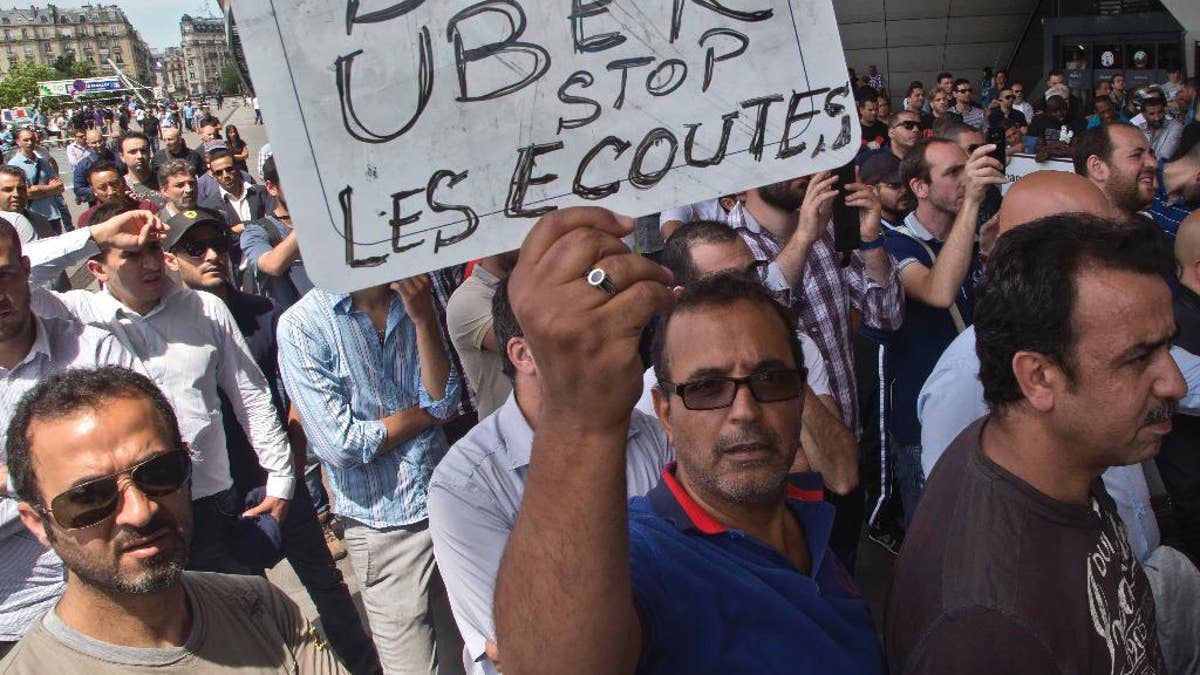
FILE - This Thursday, June 25, 2015 file photo shows a striking taxi driver holding a placard which read, "Stop Uber, Stop listening," referring to the new US spying report in France, during a taxi drivers demonstration in Paris, France. French authorities took two Uber managers into custody for questioning on Monday over "illicit activity" involving its low-cost service. The detentions came amid rising tensions between the government and the ride-hailing company, which culminated last week in a violence-marred taxi strike that blocked roads around the country. (AP Photo/Michel Euler, File) (The Associated Press)
When Courtney Love, the queen of grunge, is afraid to set foot on city streets, she must be in a pretty rough town.
In fact, Love was in Paris on Thursday morning when she tweeted that the cab she was riding in had been ambushed by a mob of taxi drivers. Love wrote: “They're beating the cars with metal bats. this is France?? I'm safer in Baghdad.”
French cab drivers smashed livery vehicles, set tires ablaze and snarled traffic across the country Thursday in a nationwide strike aimed at Uber after weeks of rising tensions directed at the U.S.-based ride-hailing company. The protests are relatively small – some estimate only five percent of cab drivers are responsible for most of the problems – but their impact is undeniable.
Love’s tweet might be an exaggeration, but her sentiment is understandable. In recent weeks, nearly 100 Uber drivers — and in some cases, their passengers, as well — have been attacked.
France’s top security official said he had ordered an immediate ban on ridesharing services, such as uberPop, in the Paris region, but no French court has declared the service to be illegal. And it’s clear the French people want low-cost options like those provided by Uber, which reports serving 400,000 customers a month in France.
French cabbies complain that Uber unfairly undercuts them and that its lower-cost service is destroying their livelihood, but they would be better off directing their frustrations at an outdated system that demands they pay tens of thousands of euros for the equivalent of cab medallions.
The taxi industry has thrived as a government-protected cartel. Working with cab owners, local governments artificially limit supply and leave riders with no other choice. As if to underscore the point, Uber’s slogan is “Choice is a beautiful thing.”
Cab riders in the U.S. and Europe alike have long suffered from the terrible customer-service experience that accompanies a lack of competition: dirty cabs, rude drivers, broken credit card machines, fares seemingly up for negotiation.
Still, the taxi industry has thrived as a government-protected cartel. Working with cab owners, local governments artificially limit supply and leave riders with no other choice. As if to underscore the point, Uber’s slogan is “Choice is a beautiful thing.”
When technology empowered a new option, ridesharing, riders around the world leaped at the chance to ditch taxis. For the first time, they could choose a service that was clean, convenient, customer-friendly and cost-saving.
In an analogy that Courtney would ... well ... love, taxi riders who switched to Uber and Lyft are much like music listeners who were the early adopters of MP3s because they were tired of being forced to buy entire albums when they only wanted one or two songs.
Not unlike cab drivers, the record labels resisted change and fought the innovations. Finally, the record companies decided to give listeners what they wanted — full and easy access to digital music. Now new platforms like Pandora pay the record labels more than $1 billion a year.
French cab drivers should take a “queue” from the music industry. Fighting your customers is a losing proposition. They need to embrace convenience, cleanliness and new technologies. Ridesharing services like Uber represent an idea whose time has come, and if French cabbies aren’t prepared to lead, they need to follow or get out of the way.








































